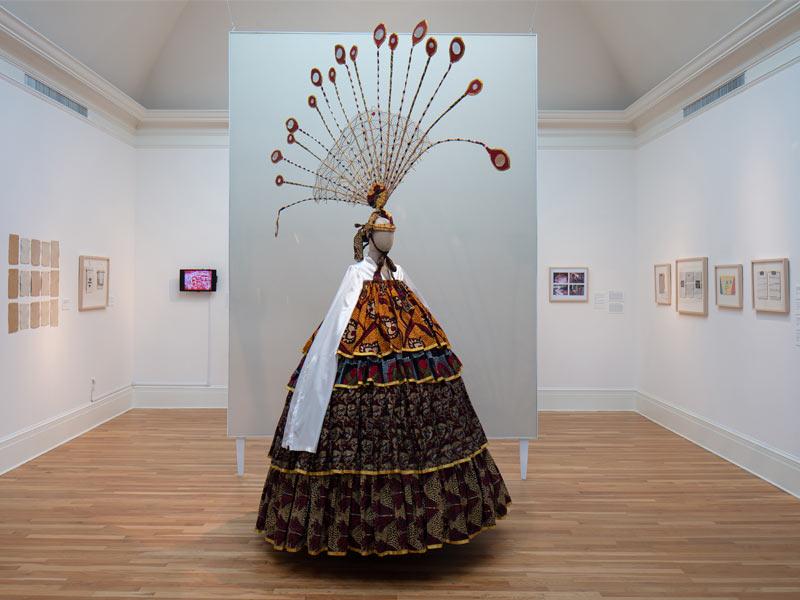Newcomb Art Museum announces public reopening
The Newcomb Art Museum invites all to join them this summer as they officially reopen to the public with the exhibition Laura Anderson Barbata: Transcommunality, on view through October 2, 2021. Starting Saturday, May 22, the museum will be open to the community, Saturday through Tuesday from 10 a.m. to 4 p.m. Admission is free, though registration is required. Tickets, tours and more information can be found at newcombartmuseum.tulane.edu.
Since the early 1990s, Laura Anderson Barbata has initiated projects with people living in the Amazon of Venezuela, Trinidad and Tobago, Mexico, Norway, and New York, bringing public attention to issues of civil, indigenous and environmental rights. Transcommunality presents together for the first time five of these multi-disciplinary collaborations from across the Americas that blend political activism, street theater, sculpture, and arts education. Through her collaborative, process-driven practice, the Mexican-born, New York-based artist engages a wide variety of platforms focusing on issues of cultural diversity and sustainability.
Each of Anderson Barbata’s projects is infused with the grounding principal of respect encapsulated by reciprocity. Collaboration and the preservation of indigenous knowledge are at the center of Transcommunality, as Anderson Barbata says, “Transcommunality is a concept and way of life that is not restricted by borders or strict definitions. It is invigorated through exchange of knowledge and conversation and is based on respect and amplifying the voices of tradition-keepers.” Though varying in process, tradition and message – each of these collaborative projects emphasizes Anderson Barbata’s understanding of art as a system of shared practical actions that has the capacity to increase communication around topics of cultural diversity and to create sites of human connection or belonging. More information on the exhibition, including a virtual artist talk and guided tour can be found here.
In addition to the public visiting hours, Newcomb Art Museum will also host free tours to the public throughout the summer, including exhibition tours each Saturday at noon, Tiffany Window tours on the third Friday of each month at noon, and the ever-popular Newcomb Pottery tours on the first Friday of the month at noon. Information about the tours and how to reserve your spot can be found at https://newcombartmuseum.tulane.edu/visit/.
Throughout May, June, and July, Newcomb Art Museum will present Louisiana Reimagines: High Culture Below Sea Level – a digital exchange between Anderson Barbata and local tradition bearers responding to the garments and stilt dancing projects presented in Transcommunality. A new performance arranged by Big Chief Shaka Zulu of the Golden Feather Hunters and filmed by Abdul Aziz will be released this summer as a way to engage virtually with Shaka’s distinct and ever-evolving New Orleans practice combining procession, drumming, elaborate 3D suits, and West African stilt dancing. Another virtual program to be released this summer, Reciprocal Exchanges, features local artists and culture bearers exchanging techniques and practices in the spirit of Anderson Barbata’s Transcommunality and an economy of sharing. These exchanges – centered on wearable art – will be released as short films presented to the public, showcasing the artists’ practices and opening new creative possibilities through engagement. For both programs, details on how to view and engage will be released via the museum’s website and e-newsletter closer to the date.
Past virtual events related to the exhibition include such programs as Reimagining Public Safety in American Cities which was presented in partnership with The Phyllis M. Taylor Center for Social Innovation and Design Thinking at Tulane and responded to ideas presented in Anderson Barbata’s Intervention: Indigo. Additionally, Uncommon Exchanges was presented in partnership with A Studio in the Woods, The ByWater Institute at Tulane University, and New Orleans Center for the Gulf South and approached Transcommunality as a catalyst for conversation working toward remedying missing narratives and providing paths forward through creative means to a more equitable, just future. Many other past digital programs are all available online at the museum’s Vimeo page.
All programs are funded in part under a grant from the Louisiana Endowment for the Humanities, the state affiliate of the National Endowment for the Humanities. Any views, findings, conclusions or recommendations expressed in this program do not necessarily represent those of the National Endowment for the Humanities. They are also supported in part by a New Orleans Jazz and Heritage Foundation Community Partnership Grant and by a Community Arts Grant made possible by the City of New Orleans and Arts Council New Orleans. Educational programming for the museum is funded by The Helis Foundation.

